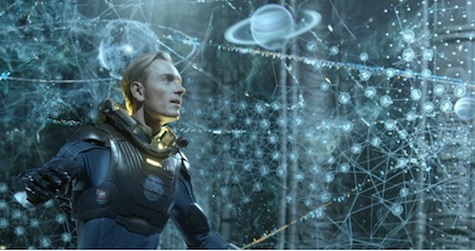It’s been quite some time since there was a big-budget Hollywood movie as thematically and intellectually ambitious as Prometheus. Not content with anything other than the biggest questions, Prometheus asks, “Where did we come from? What happens when we die? What is the purpose of all this (i.e. life on Earth and the human race in general)?” That it asks these questions with the aid of Ridley Scott’s trademark visual flair (now in very-not-bad 3D; I’m starting to come around to the thinking that 3D is okay as long as the whole movie is shot in 3D and, more importantly, I don’t have to pay a zillion dollars for it) makes it a little easier to process. That it does so in the context of being a kind-of-sort-of prequel to Alien makes it more than a little ominous.
[Read more. Some spoilers for the early plot.]
Some spoilers for the early plot.
To be perfectly clear, Prometheus is not Alien, and should not be approached as such. It’s a story set in the same universe—the pre-Yutani-merger Weyland Corporation looms large, as do their trademark androids, and their destination planet LV-223 suggests the legendary LV-426—but the events of Prometheus‘ story do not lead directly—note, directly—to the events of Alien. If anything, there’s quite a bit of deliberate distancing from the earlier movie at work in Prometheus: where everything about Alien suggested dark, grungy enclosed spaces, Prometheus is bright, clean, and expansive from its first shot, a massive landscape of a primordial, ocean-covered planetscape, on which stands a solitary cloaked figure, revealed to be a large hairless humanoid with gray-white skin, who ingests something and begins to disintegrate.
We then jump forward several eons to the late 21st century, on Earth, where scientists find a series of ancient cave paintings depicting what they determine to be a message from extraterrestrial visitors to Earth, and what protagonist Elizabeth Shaw (Noomi Rapace) believes to be an invitation to said extraterrestrials’ home planet. Elderly industrialist Peter Weyland (Guy Pearce) sponsors an exploratory voyage on the spaceship Prometheus to find the extraterrestrials, whom Shaw refers to as Engineers, as in, they engineered human life. As in, they created us. Upon landing on LV-223, the expedition finds it deserted, though there are signs that the Engineers clearly were there some millennia hence. As for why the Engineers aren’t there anymore, that’s when the expedition starts getting the sense that they’ve gotten a bit more than they bargained for on this trip.
Probably the most impressive thing about Prometheus, in light of how the anticipation for it was so inextricably tied to Alien—I’d have said “fastened to Alien‘s face with a tentacle down its throat,” but that would be excessive—is how unlike other movies it feels. Per the opening paragraph, visually and aurally Prometheus is as spectacular as we’ve come to expect from Ridley Scott, whose command over the technical aspects of cinema is as total—and whose touch with that command is elegant—as just about anyone who’s ever made a movie.
Its script stumbles in places, though the central questions it asks are genuinely profound and universal. A story built around questions is certainly allowed to not answer them all, but it’s not always confusing in the right way. All the stuff about the aliens is fine, because aliens are supposed to be inscrutable and unknowable: they’re aliens. The relationships between the people are a little muddled. We’d never know Shaw and her love interest Holloway (Logan Marshall Green) were boyfriend-girlfriend unless the movie repeatedly told us, due to their complete lack of chemistry.
The supporting cast, though, are universally pretty awesome: spaceship captain Idris Elba and corporate functionary Charlize Theron are terrific (and terrific together; there’s one scene where, contra the Shaw/Holloway non-starter, you can taste the sexual tension). Michael Fassbender walks away with the movie as the android David, who models his hair (and I guess level of radness) on Peter O’Toole in Lawrence of Arabia. Fassbender is truth and light and even triumphs over moments where the script undercuts David, because that’s what movie stars do. In an odd way, the actors making more of things than what they’re given in the script is Prometheus‘ most fundamental connection to Alien. In the latter it’s because the script was a minimalist template and the actors filled in the outlines with emotional color, and in the former, the script is a maximalist puzzle on top of which the actors coast. Still, structurally, it’s an example of Prometheus both being and not being Alien.
That kind of duality is a little troublesome in writing about the movie itself as well. I had a very difficult time watching Prometheus and didn’t personally enjoy the experience very much, primarily because of the artificiality of the character relationships, but also because of a tendency to over-explain things better left ambiguous and under-explain things that needed explanation. It would be tempting to just complain about all that for a couple thousand words, but I’d be doing the movie’s considerable assets a disservice by approaching it that way. Not only does Prometheus look and sound magnificent, any artistic endeavor that takes on questions and themes this large deserves a lot of credit. A sincere attempt at greatness beats a rote recitation of the safe and proven, any day.
Danny Bowes is a New York City-based film critic and blogger.










